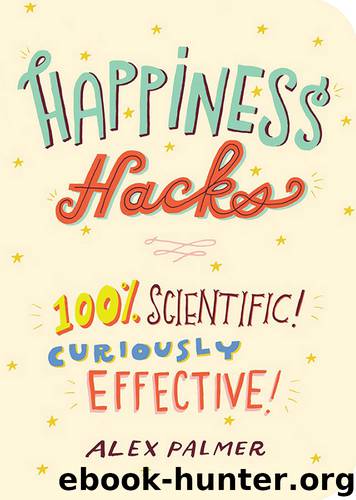Happiness Hacks by Alex Palmer

Author:Alex Palmer
Language: eng
Format: epub
ISBN: 9781615194438
Publisher: The Experiment
Embarrassment Can Be Good
“Teasing promotes positive relationships when it is done in the spirit of play. It helps people make light of conflicts and engage in the realm of humor and lightheartedness. Embarrassment triggers prosocial tendencies in others—liking, forgiveness, trust, affection.”
—Dacher Keltner, professor of psychology and codirector of the Greater Good Science Center, University of California, Berkeley
Apologize Effectively
Just as there is an effective way to complain, there is also an effective way to apologize. Not all apologies work equally well. To discern what makes the difference, a series of studies isolated three components of an apology—expressing empathy, acknowledging that social norms have been violated, and offering compensation—and examined how each component impacts the effect of the apology with the recipient.
It turned out that the apology’s effectiveness was shaped by the recipient’s “self-view.” That is, those who tracked how much each person brought to their relationships (e.g., a coworker or boss) tended to be most impacted by offers of compensation. Those who viewed relationships as part of a larger community (such as a teammate) cared more about the recognition of how social norms were violated. The takeaway is that the most effective way to handle an apology is to be sure each apology component is included, while putting a greater focus on the one likely to matter most to that specific relationship.
For example, when apologizing to a romantic partner, empathy would be better emphasized (“I understand you’re disappointed in my mistake”). For friendships, it might make more sense to focus on wider social norms.
• When apologizing, include each essential component, but be sure to vary the balance depending on the particular relationship.
Make Friends Feel Competent
Researchers at Northern Arizona University looked at the effect of different “friendship experiences” on the happiness of 4,382 college students to discern what kind of friendship was most likely to boost happiness. Through online surveys, the subjects were asked to assess the quality of their connection to a best friend in three areas: capitalization (whether their best friend is a good personal cheerleader); perceived mattering (whether they are important to their best friend); and satisfaction of psychological needs (whether they feel connected to their best friend, as well as feeling competent and able to be themselves around their friend). These were then analyzed in light of subjects’ respective, self-reported happiness levels.
The researchers found that “needs satisfaction is the most important relationship experience” of the three when it comes to predicting a person’s happiness. Drilling down deeper, they found that the most likely predictor of happiness of the three psychological needs is having a best friend who satisfies your psychological need to feel competent.
• Seek out friends who make you feel capable and competent, and provide the same to your friends.
Follow the Rules of Friendship
What makes a strong friendship? The answer would seem to vary from person to person, but back in 1984, researchers Michael Argyle and Monika Henderson pinned down some specific answers when conducting an international study on friendships that attempted to determine which rules are important for sustaining close social ties.
Download
This site does not store any files on its server. We only index and link to content provided by other sites. Please contact the content providers to delete copyright contents if any and email us, we'll remove relevant links or contents immediately.
Should I Stay or Should I Go? by Ramani Durvasula(7652)
Why We Sleep: Unlocking the Power of Sleep and Dreams by Matthew Walker(6694)
Fear by Osho(4727)
Flow by Mihaly Csikszentmihalyi(4684)
Rising Strong by Brene Brown(4448)
Why We Sleep by Matthew Walker(4432)
The Hacking of the American Mind by Robert H. Lustig(4369)
How to Change Your Mind by Michael Pollan(4354)
Too Much and Not the Mood by Durga Chew-Bose(4334)
Lost Connections by Johann Hari(4169)
He's Just Not That Into You by Greg Behrendt & Liz Tuccillo(3889)
Evolve Your Brain by Joe Dispenza(3668)
The Courage to Be Disliked by Ichiro Kishimi & Fumitake Koga(3477)
Crazy Is My Superpower by A.J. Mendez Brooks(3394)
In Cold Blood by Truman Capote(3374)
Resisting Happiness by Matthew Kelly(3336)
What If This Were Enough? by Heather Havrilesky(3308)
The Book of Human Emotions by Tiffany Watt Smith(3291)
Descartes' Error by Antonio Damasio(3270)
